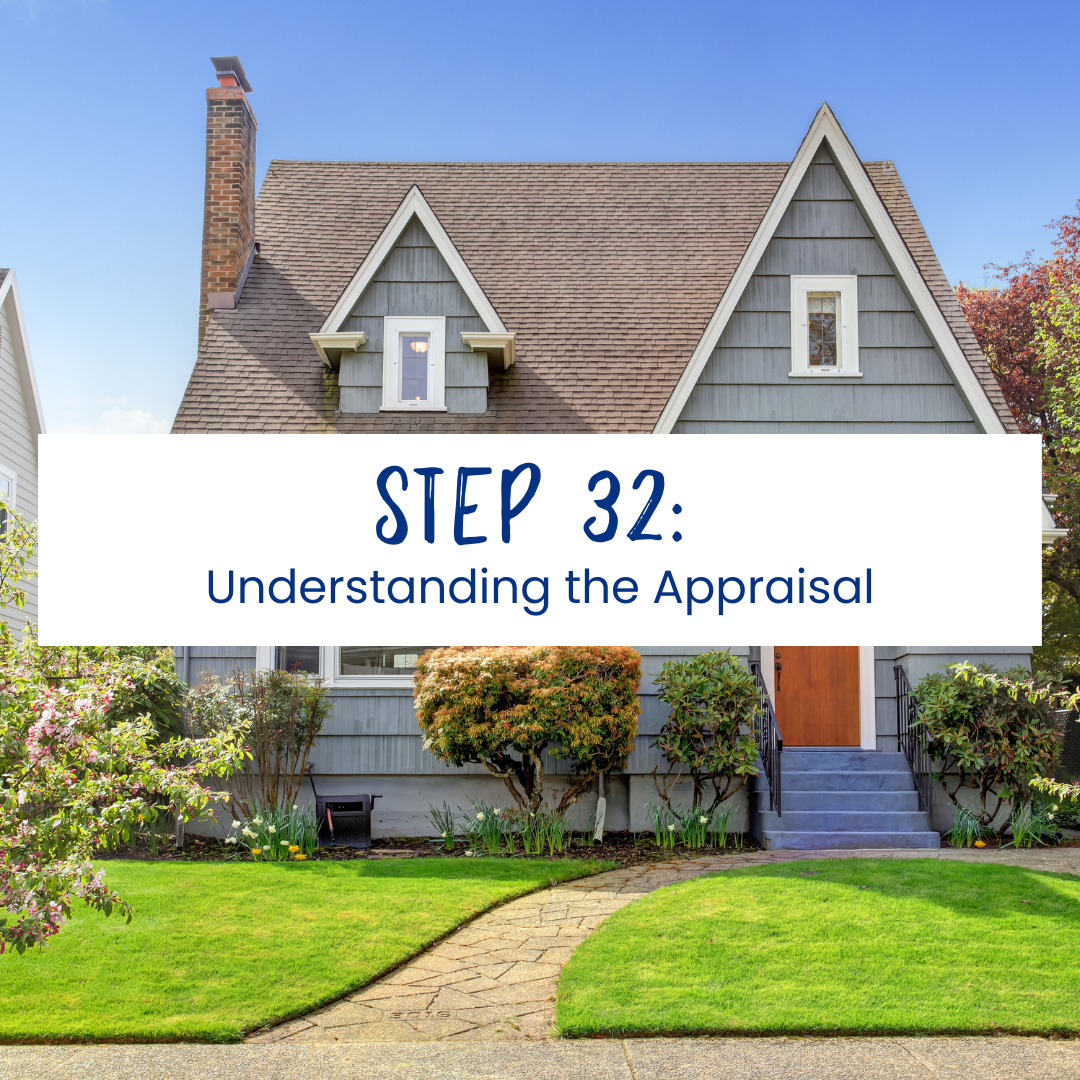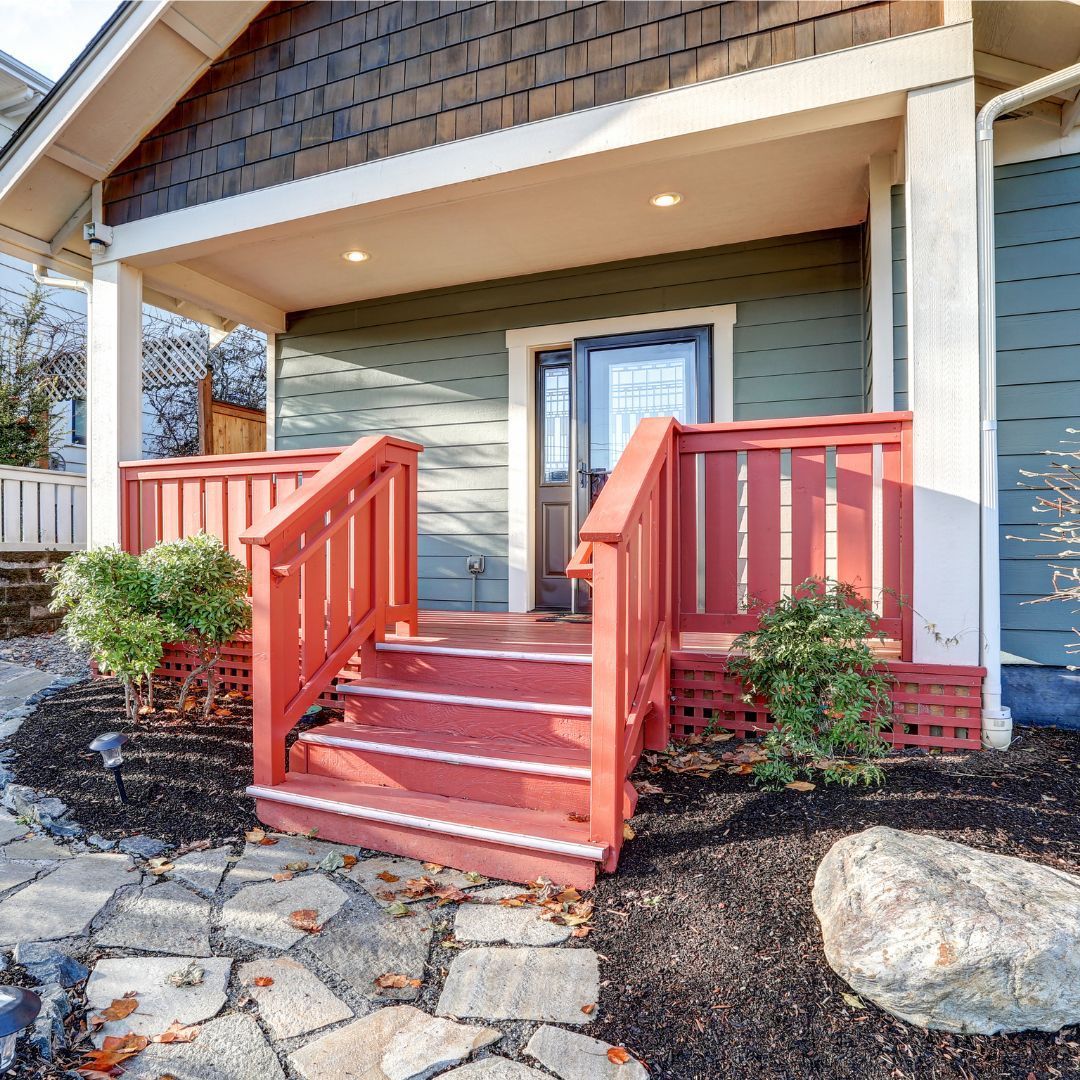Buying Step 32: Understanding the Appraisal

Step 32
You may be wondering “What is an appraisal anyway and when does it occur?”
If you are, you aren’t alone. We get asked this question all the time after we’ve made an offer on a house and had the inspection done. The rest of the process including the appraisal, underwriting, and title is a bit fuzzy to most people.
In addition, you might be wondering:
- Does the Buyer or the Seller pay for the appraisal? (Buyer)
- Who hires the appraiser? (Buyer’s Bank)
- Who performs the appraisal? (Buyer’s Bank)
- Who pays for the appraiser? (Buyer)
- What happens if the appraisal comes in lower than the purchase price of the home?
These are all great questions!
Scenario #1:
But what happens if you’re the Buyer paying $800,000 for a home and the appraisal value comes in right at the purchase amount price? Is this a good or bad thing? PANIC (just kidding). This is definitely a good thing as it means the bank will give you a loan for the full amount of the appraisal price.
Scenario #2:
But what happens when an appraisal comes in high (where the appraisal amount is over the purchase price) and does this happen very often? No, it’s very rare for an appraisal to come in over the purchase price as the bank just needs to know that the property is worth the purchase price so they feel comfortable giving you a loan. Therefore, it’s not common for an appraisal to come in over the purchase price. When it does, Buyers are often very ecstatic as, essentially, you now have instant equity as we got you a great deal! As the Buyer, all in all, it’s best when the purchase price comes in at or close to the purchase price.
Home Appraisals: 4 Questions Before You Buy
By Craig Donofrio | Aug 12, 2014
REALTOR.com
Home appraisals are a part of the home buying process that can be confusing for first timers. When you go to buy a home, your mortgage lender will want to know whether the house you are interested in buying is worth the amount you are willing to spend. They need to check out the house for anything that can devalue or increase the property’s worth. To do this, they require home appraisals for all borrowers.
Here are four common questions—and answers—about home appraisals.
What is a home appraisal?
A property appraisal is an estimate of a property's value. Property value is based on such factors as location, amenities, structural condition, and recent sales of similar local properties.
A home appraiser conducts the process. The appraiser will do a walk-through of the property, noting anything that can alter the home’s value. For example, if the house has a swimming pool but swimming pools aren’t popular in the area, it might not add much value to the property—the pool might even detract from it.
The appraiser will sketch and take photos of the property layout and will look for any safety code violations. If there are any, you may need to fix them before the lender approves the loan.
Who performs home appraisals?
Home appraisers are third-party certified or licensed contractors, and the lender usually hires them. They are knowledgeable in real estate and are required to know how to evaluate a property on factors such as neighborhood growth, neighborhood housing trends, and market conditions.
To be safe, make sure the person doing your home appraisal is certified and deals with multiple lenders. If the appraiser only works with one other lender, he may have outside interests—and you may not receive a correct assessment.
Who pays for home appraisals?
The cost of home appraisals depends on the property value, location, and size of your property. They cost a few hundred dollars and typically the Buyer pays the fee at closing, although you can opt to pay it up-front. A good faith estimate—also known as a GFE—given to you by the lender will supply a fee for the appraisal. These home appraisals are cheaper than traditional ones, but you should ask your lender if they will consider it before you purchase.
How long do home appraisals take?
For most loans, a typical property assessment takes a half hour or less. Turnaround time for home appraisals should be within 7 – 21 days, although a busy market can mean a longer wait.
The appraiser will give the final documents—called the appraisal report—to the lender, who is required to show it to the Buyer. Make sure you obtain a copy for your own records.
Updated from a previous article by MortgageMatch.com.
Craig Donofrio covers home finance and all things real estate for realtor.com. His work has been featured in outlets such as The Street, MSN, and Yahoo News. Follow @CJDonofrio
Most people have deeply personal reasons for wanting to buy a home. Maybe it’s the bathroom that feels like a dreamy, modern spa. Or that two-tiered deck just made for parties.
Your Lender doesn’t care about the freestanding tub. Or the built-in outdoor fire pit. Their only concern is that the house you buy is worth as much as the value of your mortgage.
To them, a house isn’t a home. It’s collateral. (Harsh, but true.) If someday, for some reason, you can’t make your mortgage payments, the lender can foreclose on the home and sell it to recoup all or some of its costs. (Even harsher, but also true.)
For that reason, a home must be valued at, or above, the agreed-upon purchase price, and this has to happen before you can close on a house. That’s where a home appraiser comes in.
A Home Appraiser Is Neutral (Like Switzerland)
After you sign a Purchase & Sales Agreement and before your lender approves your loan, the home you’re buying must pass an appraisal — an assessment of the property’s value by an unbiased third party: the appraiser.
Does the Appraiser Have the Big Picture?
Brokers should make sure the appraiser has details on everything from the home’s major upgrades, like an addition, to the age of major systems and structures, like the roof and HVAC.
An Appraiser is a state-licensed professional. Their job is to assess an opinion of value — how much a house is worth. The appraiser is on no one’s side. They don’t represent you or the Seller; instead, this person is a contractor chosen by your Lender through an Appraisal Management Company (AMC), a separate, neutral entity that maintains a roster of appraisers.
Appraisers survey a house in person, using five main criteria to determine the value of a home:
- Location
- Age
- Condition
- Additions or renovations
- Recent sales of comparable homes
Be Prepared to Pay for the Appraisal
Generally speaking, the home Buyer is responsible for paying for the appraisal — and the fee is typically wrapped into your closing costs.
Appraisals Take a While, So Be Patient
So, You Have a Valuation. Here’s What It Means — and What to Do Next
When the appraisal is finished, the appraiser issues a written report with his or her opinion of the value of the home. To produce the report, they use their analysis of the property and data from comparable homes, as well as review the purchase offer. The report will outline their methodology and also include photographs that they’ve taken of the property, inside and out.
You and your Lender will both receive a copy of the report. Three things could happen next:
Scenario #3:
If the appraisal is lower than what you’ve agreed to pay for the home: Your lender won’t give you a loan for more than the appraised value. If you and the Seller agreed on $800,000, for example, but the appraisal is $750,000, that creates a $50,000 shortfall. So what happens next?
Don’t despair — not yet. If you’re faced with a low appraisal, there are several ways the deal can still go through.
If an Appraisal Is Low, You Can Still Make It Work
Before we talk strategy, some reasons why appraisals come in lower than expected:
An appraiser should be very familiar with the area the home is in, given that markets can vary within blocks. A good comp rule of thumb to avoid incorrect valuations: Would a Buyer likely purchase the comp if the subject property wasn’t available?
- The Seller overvalued the price of the home.
- The appraiser isn’t familiar with the neighborhood.
- The appraiser overlooked pending sales data.
- The appraiser had trouble finding comparable homes or missed comparable homes, so they compared your home with properties outside the neighborhood.
- Home prices in the area are changing so fast that the listing agent’s price no longer reflects the market.
- The appraiser rushed the job.
Option A:
If the appraisal comes in low, I’ll have recommendations about how to proceed based on the results. In general, your best strategy is to persuade the Seller to lower the sales price, or to split the difference between the home’s appraised value and the price with you. This means a new round of negotiation.
Option B:
You can also appeal the appraisal assessment. You’ll work with your agent to research comparable homes that support the sales price you agreed upon with the Seller and present this information to your lender, who will forward it to the appraiser for a re-evaluation of the home’s value. Ultimately, though, it’s up to the appraiser to decide whether to revise their valuation of the property
Option C:
Alternatively, you can ask your lender for a second appraisal, though there are caveats:
- You’ll have to pay for it out of pocket (or persuade the Seller to foot the bill).
- You’re more likely able to challenge an appraisal for a conventional loan than a government loan. And you’d need solid facts to back it up in either case.
- There’s no guarantee that it will be higher and meet the sales price.
Option D:
The last option: You can come up with the cash yourself to cover the difference between the home’s price and the appraised value.
If you don’t want to take that route (and who could blame you?), a purchase and sale agreement’s home appraisal contingency gives you the ability to walk away from the deal scot-free and with your earnest money deposit in hand.
But today, let’s assume it all works out. With the appraisal behind you, you’ll be one step closer to closing on that house.
Questions? Contact us at andi@andidyer(dot)com or 360-734-6479.

















